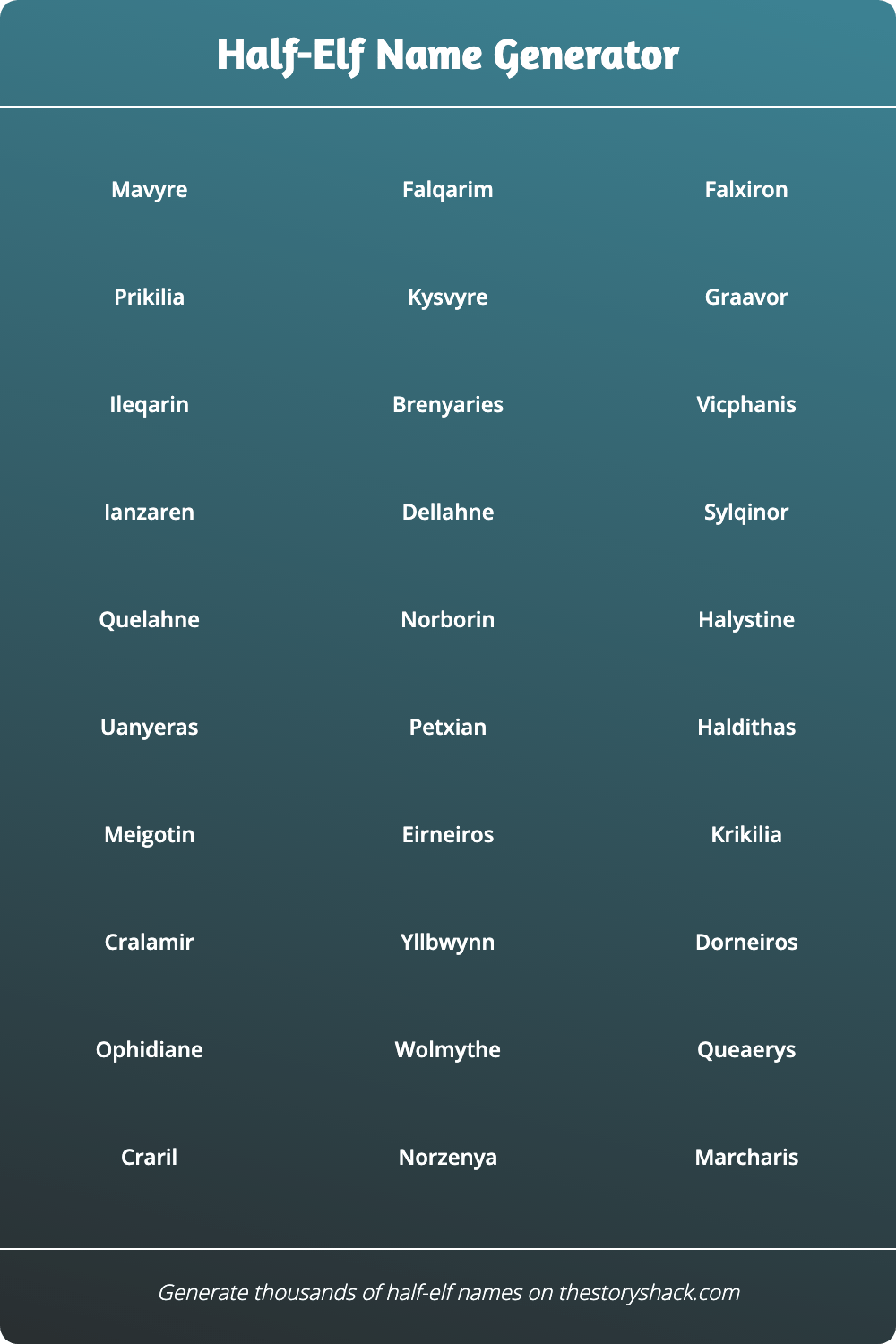Enchanting Half-Elf Names: A Guide To The Best Names For Your Characters
When it comes to creating unique characters in fantasy settings, half-elf names hold a special charm. These names often reflect a blend of human and elven heritage, incorporating the beauty of both cultures. For writers, gamers, or anyone interested in fantasy lore, understanding the significance and nuances of half-elf names can add depth to their characters. From elaborate titles to simple yet elegant choices, half-elf names can encapsulate the essence of the character’s background, personality, and the worlds they inhabit.
Half-elves, as a fusion of two distinct races, tend to have names that mirror their diverse heritage. These names may draw from the lyrical and melodic sounds often associated with elven languages, while also incorporating more grounded and robust elements typical of human names. This combination not only enhances their uniqueness but also allows for a wider range of character development, as each name can evoke different traits and histories.
Whether you're crafting a backstory for a tabletop role-playing game or writing a fantasy novel, selecting the right half-elf name is crucial. It sets the tone and can influence how audiences perceive the character. In this article, we will explore some fascinating aspects of half-elf names, including their origins, notable examples, and tips for creating your own unique names. Dive in and discover the enchanting world of half-elf names!
What Are the Origins of Half-Elf Names?
Half-elf names often stem from a blend of elven and human naming conventions. Elves typically have names that are fluid and melodic, while human names can be more varied and straightforward. This fusion creates names that are not only beautiful but also rich in meaning. For instance, an elven name might emphasize nature and grace, while a human name might reflect strength or resilience. The combination allows for a name that is both poetic and grounded.
How Do Half-Elf Names Reflect Their Heritage?
Half-elves often find themselves in a liminal space between two worlds, and their names can reflect this duality. Names can carry elements from both cultures, representing the character's internal struggles and unique identity. For example, a half-elf named "Elowen Grey" might suggest an elven lineage (Elowen meaning ‘elm tree’ in the elven tongue) while "Grey" could hint at a human background or even a metaphorical reference to the character's journey between light and dark.
Are There Common Themes in Half-Elf Names?
Indeed, many half-elf names share common themes that resonate with the traits of their mixed heritage. Some popular themes include:
- Nature: Many names are inspired by flora, fauna, or natural elements, reflecting the elven connection to nature.
- Valor: Human names often depict strength and bravery, embodying the spirit of adventure.
- Harmony: Names that suggest balance are common, symbolizing the peace between their two heritages.
- Mythical References: Some names may even draw from ancient tales or folklore, adding an extra layer of depth.
What Are Some Popular Half-Elf Names?
As you delve into the world of half-elf names, you'll find that some names have become classics in fantasy literature and gaming. Here are a few examples:
- Aranel: Meaning ‘noble maiden,’ this name conveys grace and strength.
- Caelum: Meaning ‘sky’ in Latin, this name reflects freedom and expansiveness.
- Lyra: A name that evokes music and art, embodying the elven love for beauty.
- Thalion: Meaning ‘strong’ in Elvish, perfect for a character with a brave heart.
How to Create Unique Half-Elf Names?
Creating unique half-elf names can be a fun and fulfilling process. Here are some tips to help you craft the perfect name:
- Blend Languages: Try combining elements from elven and human names. This can be as simple as mixing syllables or combining meanings.
- Consider Character Traits: Think about your character’s personality, background, and adventures. Choose names that reflect these qualities.
- Use Nature as Inspiration: Many elven names draw from nature. Look to trees, animals, and celestial bodies for inspiration.
- Experiment with Phonetics: Play around with how the name sounds. Elven names often have a melodic quality, so consider the flow.
Are There Any Notable Half-Elf Characters in Literature?
Yes, many beloved characters in fantasy literature are half-elves, showcasing the rich potential of these names. Some notable examples include:
- Legolas from J.R.R. Tolkien's "The Lord of the Rings": Though primarily an elf, his interactions with humans highlight the dual heritage.
- Raistlin Majere from the "Dragonlance" series: A complex character whose half-elf lineage plays a significant role in his story.
- Drizzt Do'Urden from R.A. Salvatore's "Forgotten Realms": A drow elf with a human heart, representing the struggle between two worlds.
Conclusion: The Magic of Half-Elf Names
Half-elf names are a beautiful expression of the characters’ rich and complex backgrounds. They offer a way to weave together the strengths and weaknesses of both human and elven heritages, creating characters that resonate on multiple levels. Whether you’re writing a gripping fantasy novel or playing an immersive role-playing game, choosing the right half-elf name can make all the difference. Embrace the enchanting world of half-elf names and let your creativity soar as you craft characters that live on in the hearts and minds of your audience.
Unveiling The Mystery: Where Does Whistlin Diesel Live?
Unveiling The Mystery: McKinley Richardson Height
Enchanting Names That Mean Unicorn


